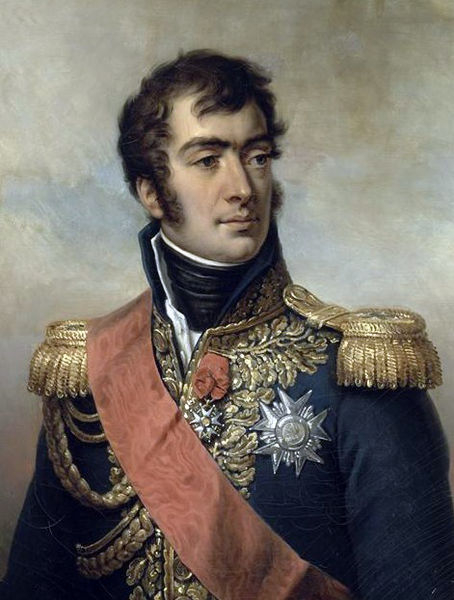<Back to Index>
- Biologist Richard Owen, 1804
- Painter and Photographer László Moholy Nagy, 1895
- Marshal of France Auguste Frédéric Louis Viesse de Marmont, 1774
PAGE SPONSOR

Auguste Frédéric Louis Viesse de Marmont, 1st Duke of Ragusa (20 July 1774 – 22 March 1852) was a French General, nobleman and Marshal of France.
Marmont was born at Châtillon-sur-Seine, the son of an ex-officer in the army who belonged to the petite noblesse and adopted the principles of the Revolution. His love of soldiering soon showed itself, and his father took him to Dijon to learn mathematics prior to entering the artillery, and there he made the acquaintance of Napoleon Bonaparte, which he renewed after obtaining his commission when he served in Toulon.
The acquaintance ripened into intimacy; Marmont became General Bonaparte's aide-de-camp, remained with him during his disgrace and accompanied him to Italy and Egypt, winning distinction and promotion to general of brigade. In 1799 he returned to Europe with his chief; he was present at the coup d'état of the 18th Brumaire, and organized the artillery for the expedition to Italy, which he commanded with great effect at Marengo. For this he was at once made general of division. In 1801 he became inspector general of artillery, and in 1804 grand officer of the Legion of Honour, but was greatly disappointed at being omitted from the list of officers who were made marshals.
In 1805 he received the command of a corps, with which he did good service at Ulm. He was then directed to take possession of Dalmatia with his army, and occupied the Republic of Ragusa. For the next five years he was military and civil governor of Dalmatia, and traces of his beneficent régime still survive both in great public works and in the memories of the people. In 1808 he was made duke of Ragusa, and in 1809, being summoned by Napoleon to take part in the War of the Fifth Coalition, he marched to Vienna and bore a share in the closing operations of the campaign. Napoleon now made him a Marshal of France and governor general of all the Illyrian provinces of the empire.
In July 1810 Marmont was hastily summoned to succeed Masséna in the command of the French army in the north of Spain. His relief of Ciudad Rodrigo in the autumn of 1811 in spite of the presence of the British army was a great feat, and in the manoeuvring which preceded the battle of Salamanca he had the best of it. But Wellington more than retrieved his position in the battle, and inflicted a severe defeat on the French. Marmont and his deputy commander Comte Jean-Pierre François Bonet were both struck by shrapnel very early in the battle, Marmont was gravely wounded in the right arm and side and command of the battle passed to Bertrand Clausel. He now retired to France to recover.
In April 1813 Napoleon gave him the command of a corps, which he led at the battles of Lützen, Bautzen and Dresden. He then fought throughout the great defensive campaign of 1814 until the last battle before Paris, from which he fought a skilful fighting retreat drawing back his forces to the commanding position of Essonne and inflicting high casualties on the enemy.
Marmont
then took upon himself a political role, seeking to halt what he now
saw as a pointless prolonging of a war which France would now assuredly
lose. Marmont contacted the Allies and reached a secret agreement with
them. As the Allies closed on Montmartre, Marmont - together with
marshals Mortier and Moncey - marched to a position where they were
quickly surrounded by Allied troops and then surrendered their forces,
as had been agreed. Marmont stayed loyal to the restored Bourbon king Louis XVIII during the Hundred Days, and following Waterloo voted in favour of the execution of Marshal Ney. He was made a peer of France and a major general of the royal guard, and in 1820 a knight of the Order of the Holy Spirit and a grand officer of the Order of St Louis. He was the major general of the guard on duty in July 1830 during the July Revolution, and was ordered to put down with a strong hand any opposition to the
ordinances. Himself opposed to the court policy, he yet tried to do his
duty, and only gave up the attempt to suppress the revolution when it
became clear that his troops were outmatched. This brought more obloquy upon him, and the Duke d'Angoulême even ordered him under arrest, saying: Will you betray us, as you betrayed him? Marmont
accompanied the king into exile and forfeited his marshalate. His
desire to return to France was never gratified and he wandered in
central and eastern Europe, settling finally in Vienna, where he was
well received by the Austrian government, and, strange to say, made
tutor to the duke of Reichstadt, the young man who had once for a few weeks been styled Napoleon II. He died at Venice in
March 1852, the last living Napoleonic Marshal. Despite his long
friendship with Napoleon, by this time the verb "raguser" - derived
from his title, the Duke of Ragusa - was a household word in France: it
meant "to betray". In his last years, Marmont spent much of his time working on his Mémoires, which are of great value for the military history of the time.